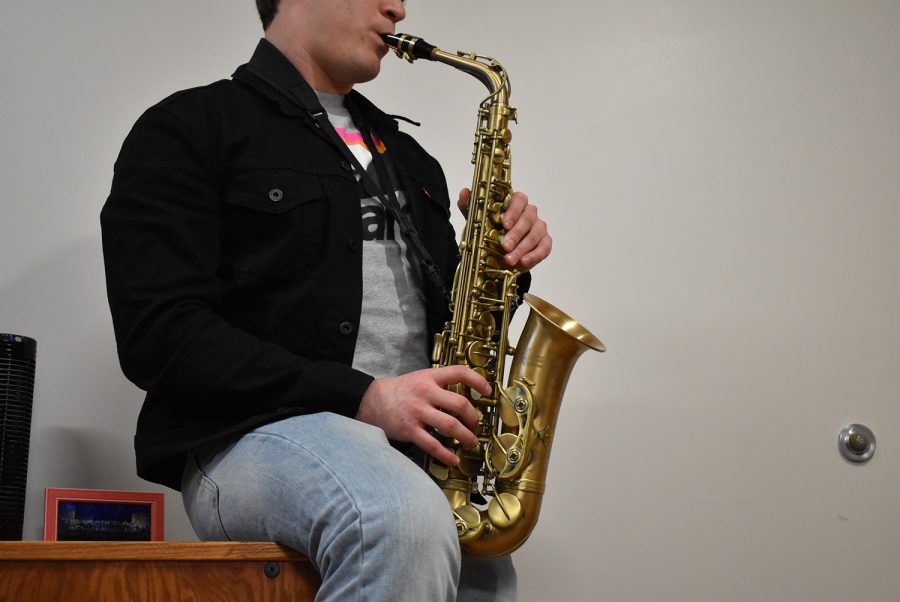University of Iowa researchers continue to study music’s physical effect on the brain
University of Iowa researchers are studying how music physically affects the brain to determine how it connects to emotions and memories in people undergoing therapy for illnesses such as dementia and Alzheimer’s disease.
Easa Aristizabal plays George Micheals “Careless Whisper” on his saxophone on Monday, Feb. 24, 2020.
March 9, 2020
University of Iowa researchers in the Psychological and Brain Sciences Department are expanding upon an existing study of the physical effects of music on the brain to determine how it connects to memory and emotion.
UI neurology Professor Daniel Tranel said music depends on the primitive, ancestral brain structures that relate it to the production of emotions and memories.
“You can trigger a vivid, autobiographical memory from a previous time period in your life by hearing a blast of a song that was really important to you during that time,” Tranel said. “If I heard a song from 1972, it would bring me back to a normal high-school day.”
Scientists and neurologists currently understand that music has an effect on the brain, he said, but they do not structurally know how. With a recent grant from the university, UI researchers can begin studying how networks in the brain respond to music, he said.
Using functional Magnetic Resonance Imaging, researchers can see how areas in the brain are activated once test subjects hear familiar music, and study how that activation is interrupted due to brain injuries such as stroke or brain tumors, Tranel said.
UI biology Professor Joshua Weiner, the Iowa Neuroscience Institute associate director, said in an email to The Daily Iowan that the brain tends to encode emotional events more deeply in memory.
People with neurodegenerative diseases such as dementia can often remember music, lyrics, and melodies better than other things due to the emotions associated with the music, he added.
“Music has a higher emotional content for us due to [the meaning] of the lyrics or the feelings that certain patterns of melodies and harmonies give us,” Weiner said.
RELATED: UI neuroscience researchers share new treatments, unexpected discoveries at faculty TED talks
Tranel said playing music for dementia patients can trigger autobiographical memories and positive emotions associated with nostalgia and reminiscence.
“It’s often comfortable for older people and demented people to take a trip down memory lane and remember the past,” he said. “You can often see people get lost in their memories.”
Studying the positive effects of music can provide methods to dampen memory impairment that dementia and Alzheimer’s cause, Tranel said, transitioning music from an enjoyable activity to a therapeutic one.
UI undergraduate music-therapy program Director Mary Adamek said music therapy provides for a broad range of age and ability, from helping young children with autism to older people with dementia.
“Music stimulates many areas,” Adamek said. “Remembering might be hard, but improving their mood will help them feel familiar and connected to others from their past and present.”
Therapy for dementia involves picking familiar music and changing the tempo or the key to fit their mood, she said.
For music therapy to work to its fullest potential, Adamek said the UI music-therapy program caters to the goals of the patients themselves and what their goals are for therapy.
“Someone that had a stroke might want to improve their physical skills, so we will do exercises with rhythm,” she said. “It is different for every patient.”
Tranel said this research is important because of the vast areas that music stretches to within the UI community, providing opportunities for many collaborations between brain scientists, psychologists, musicians, and music professors.
“Music is everywhere,” he said. “Every culture that has ever been known has had music. [It’s no surprise] that it has such an effect on how we associate emotions and memory.”





















